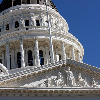Online Public Meetings Still Allowed Until September 30

June 2021
Number 12
On March 17, 2020, the Governor issued Executive Order N-29-20. This order allowed local agencies to address emergent pandemic conditions by allowing local officials, and the public, to participate in public meetings via virtual platforms. Ordinarily, board attendance via teleconference is regulated by certain provisions of California’s open meeting law, the Ralph M. Brown Act (Brown Act). With recent announcements anticipating the end of certain COVID-19 related restrictions, questions have arisen as to whether local officials will continue to have flexibility to attend public meetings virtually.
On June 11, 2021, the Governor issued Executive Order N-08-21, which expressly extends the flexibility concerning the conduct of public meetings through September 30, 2021. Thus, all local government agencies can continue to conduct their public meetings online through September 30.
Background
The Brown Act gives the public a right to attend meetings of local legislative bodies and publicly comment on any item on the agenda or any item of interest to the public that is within the subject matter jurisdiction of the legislative body. Ordinarily, if a member of the legislative body attends a meeting remotely by phone or video, the Brown Act contains specific procedural requirements. During the pandemic, the Governor temporarily relaxed these Brown Act requirements.
Under Executive Order N-29-20 and preceding orders, local agency legislative body members may attend regular, special, or emergency meetings by telephone or video conference. The order suspended the following requirements which normally apply to teleconference attendance:
These requirements were suspended on the condition that 72 hour or 24 hour (whichever applies) public notice is still given, and that the notice inform members of the public how they may observe the meeting and offer public comment. Local agencies have relied on this Executive Order to hold virtual meetings throughout the pandemic. For more about Executive Order N-29-20, see our March 27, 2020 Client News Brief, How to Address COVID-19 with Your Governing Board: Brown Act Reminders.
Virtual Meetings After State Reopening
Executive Order N-08-21, issued on June 11, 2021, supersedes and replaces Executive Order N-29-20. The initial order made these flexibilities effective “during the period in which state or local public health officials have imposed or recommended social distancing measures.” The new order, N-08-21, ends them on September 30, 2021.
It is possible that the Legislature will amend open meetings laws to address the possibility of ongoing online meetings. The Legislature is currently considering several bills that would change the requirements for public meeting participation options, including:
We will continue to monitor and report on the progress of these bills.
Safety Measures at Public Meetings
While there are still unanswered questions about the latest guidance as applied to public meetings, board meetings will continue to be subject to California Department of Public Health (CDPH) Guidance for Face Coverings. The CDPH has now stated in a FAQ that local legislative body meetings are “indoor public settings” where masks are required for unvaccinated individuals. According to CDPH, local boards—like California businesses—may choose to:
This is consistent with guidance applicable to employees under the Division of Occupational Safety and Health (Cal/OSHA) Standards. On June 17, the California Occupational Safety and Health Standards Board adopted a rule which requires face coverings for workers who are not fully vaccinated when indoors and in vehicles. Under the Labor Code, Cal/OSHA has jurisdiction to regulate any place where employment is carried on, with limited exceptions. (Lab. Code, §§ 6303-6304.) The definition of employer includes “each county, city, district, and all public and quasi-public corporations and public agencies therein.” (Lab. Code, § 3300.) Further, pursuant to Section 3351, employees subject to Cal/OSHA regulation include every person employed by an employer, as well as “[a]ll elected and appointed paid public officers,” and “[a]ll officers and members of boards of directors of quasi-public or private corporations while rendering actual service for the corporations for pay.” (Lab. Code, § 3351.) Accordingly, when a school district / local agency returns to in-person meetings, its personnel and board members will still be required to comply with the Cal/OSHA standards then-applicable to employees in the workplace.
The new face mask requirements are addressed in Lozano Smith’s recent Client News Brief, Face Coverings Still Required in Certain Circumstances under New Rules.
One unresolved question specific to school board meetings is whether the mask requirement for K-12 school settings applies to board meetings that are held in K-12 facilities. CDC/CDPH guidance currently requires masks for all “indoors in K-12 schools, childcare, and other youth settings.” Unfortunately, the guidance is vague, and does not distinguish one way or the other between operation of schools versus meetings held on school district property that occur after school hours. At this time, there is no definitive answer to this question. We expect that the issue will be addressed in the future, and note that CDC guidance on K-12 settings is expected to change again before September 30.
As guidance continues to evolve, agencies opting to return to in-person meetings may wish to consult with their County Health Officer and their legal counsel.
If you would like more information or assistance regarding virtual or in-person meetings, please contact an attorney at one of our eight offices located statewide. You can also subscribe to our podcast, follow us on Facebook, Twitter and LinkedIn or download our mobile app.
Number 12
On March 17, 2020, the Governor issued Executive Order N-29-20. This order allowed local agencies to address emergent pandemic conditions by allowing local officials, and the public, to participate in public meetings via virtual platforms. Ordinarily, board attendance via teleconference is regulated by certain provisions of California’s open meeting law, the Ralph M. Brown Act (Brown Act). With recent announcements anticipating the end of certain COVID-19 related restrictions, questions have arisen as to whether local officials will continue to have flexibility to attend public meetings virtually.
On June 11, 2021, the Governor issued Executive Order N-08-21, which expressly extends the flexibility concerning the conduct of public meetings through September 30, 2021. Thus, all local government agencies can continue to conduct their public meetings online through September 30.
Background
The Brown Act gives the public a right to attend meetings of local legislative bodies and publicly comment on any item on the agenda or any item of interest to the public that is within the subject matter jurisdiction of the legislative body. Ordinarily, if a member of the legislative body attends a meeting remotely by phone or video, the Brown Act contains specific procedural requirements. During the pandemic, the Governor temporarily relaxed these Brown Act requirements.
Under Executive Order N-29-20 and preceding orders, local agency legislative body members may attend regular, special, or emergency meetings by telephone or video conference. The order suspended the following requirements which normally apply to teleconference attendance:
- A quorum of the members must participate from locations within the boundaries of the agency and each location must be accessible to the public;
- Each teleconference location from which a member will participate must be publicly noticed, and agendas must be posted at each teleconference location;
- Each teleconference location must be accessible to the public;
- Members of the public may address the body at each teleconference location; and
- At least one member of the legislative body must be physically present at the location specified in the notice of the meeting.
These requirements were suspended on the condition that 72 hour or 24 hour (whichever applies) public notice is still given, and that the notice inform members of the public how they may observe the meeting and offer public comment. Local agencies have relied on this Executive Order to hold virtual meetings throughout the pandemic. For more about Executive Order N-29-20, see our March 27, 2020 Client News Brief, How to Address COVID-19 with Your Governing Board: Brown Act Reminders.
Virtual Meetings After State Reopening
Executive Order N-08-21, issued on June 11, 2021, supersedes and replaces Executive Order N-29-20. The initial order made these flexibilities effective “during the period in which state or local public health officials have imposed or recommended social distancing measures.” The new order, N-08-21, ends them on September 30, 2021.
It is possible that the Legislature will amend open meetings laws to address the possibility of ongoing online meetings. The Legislature is currently considering several bills that would change the requirements for public meeting participation options, including:
- Assembly Bill (AB) 339 proposed making permanent a requirement that the public be able to attend and comment at Board meetings remotely, providing phone and internet based options. AB 339 was approved 54-9 by the Assembly on June 2, 2021, and headed to the Senate Governance and Finance Committee and the Senate Judiciary Committee. However, the bill came out of the Assembly with significant amendments. As currently amended, the bill would apply only to cities and counties with populations of 250,000 or more, and would not apply at all to other types of local agencies, including school districts. Additionally, the scope of the bill was narrowed to require an option for the public to participate in meetings remotely by either phone or internet, not both.
- AB 361 would permit local agencies to conduct public meetings virtually during a declared local or state emergency, without having to rely on the Governor issuing another executive order to suspend these open meeting requirements. AB 361 was approved by the Assembly last month (May 2021) 62-4, and has been referred to the Senate Governance and Finance Committee and the Senate Judiciary Committee.
We will continue to monitor and report on the progress of these bills.
Safety Measures at Public Meetings
While there are still unanswered questions about the latest guidance as applied to public meetings, board meetings will continue to be subject to California Department of Public Health (CDPH) Guidance for Face Coverings. The CDPH has now stated in a FAQ that local legislative body meetings are “indoor public settings” where masks are required for unvaccinated individuals. According to CDPH, local boards—like California businesses—may choose to:
- Provide information to all attendees regarding vaccination requirements and allow vaccinated individuals to self-attest that they are in compliance prior to entry.
- Require proof of vaccination.
- Require all attendees to wear masks.
This is consistent with guidance applicable to employees under the Division of Occupational Safety and Health (Cal/OSHA) Standards. On June 17, the California Occupational Safety and Health Standards Board adopted a rule which requires face coverings for workers who are not fully vaccinated when indoors and in vehicles. Under the Labor Code, Cal/OSHA has jurisdiction to regulate any place where employment is carried on, with limited exceptions. (Lab. Code, §§ 6303-6304.) The definition of employer includes “each county, city, district, and all public and quasi-public corporations and public agencies therein.” (Lab. Code, § 3300.) Further, pursuant to Section 3351, employees subject to Cal/OSHA regulation include every person employed by an employer, as well as “[a]ll elected and appointed paid public officers,” and “[a]ll officers and members of boards of directors of quasi-public or private corporations while rendering actual service for the corporations for pay.” (Lab. Code, § 3351.) Accordingly, when a school district / local agency returns to in-person meetings, its personnel and board members will still be required to comply with the Cal/OSHA standards then-applicable to employees in the workplace.
The new face mask requirements are addressed in Lozano Smith’s recent Client News Brief, Face Coverings Still Required in Certain Circumstances under New Rules.
One unresolved question specific to school board meetings is whether the mask requirement for K-12 school settings applies to board meetings that are held in K-12 facilities. CDC/CDPH guidance currently requires masks for all “indoors in K-12 schools, childcare, and other youth settings.” Unfortunately, the guidance is vague, and does not distinguish one way or the other between operation of schools versus meetings held on school district property that occur after school hours. At this time, there is no definitive answer to this question. We expect that the issue will be addressed in the future, and note that CDC guidance on K-12 settings is expected to change again before September 30.
As guidance continues to evolve, agencies opting to return to in-person meetings may wish to consult with their County Health Officer and their legal counsel.
If you would like more information or assistance regarding virtual or in-person meetings, please contact an attorney at one of our eight offices located statewide. You can also subscribe to our podcast, follow us on Facebook, Twitter and LinkedIn or download our mobile app.
Disclaimer: As the information contained herein is necessarily general, its application to a particular set of facts and circumstances may vary. For this reason, this News Brief does not constitute legal advice. We recommend that you consult with your counsel prior to acting on the information contained herein.






